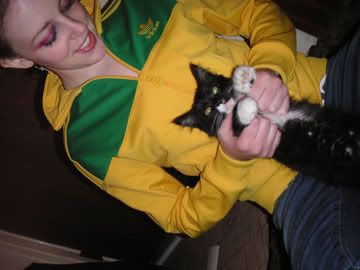I had to read And the Ass Saw the Angel because I'm a Nick Cave fangirl. I met a fellow obsessive Cave fan a couple of months ago, and in discussing various things, I had to admit I hadn't read either of Cave's novels. My excuse had always been that And the Ass is out-of-print, and Xenu-forbid I spend more than four dollars on a book. But, I shouldn't be a bad fangirl. So, I found a used copy online for ten bucks shipped—a miracle, as this wasn't the first time I was looking for a cheap copy—and finally read the damn thing. I love Cave because he crams his songs with figurative language, allusions, and philosophical queries ("if I have no free will, then how can I be morally culpable?"). I get not only the visceral ROCK AND ROLL! sensation from his music, but also the "I think I'm getting smarter" feeling.
I'm having trouble objectively reviewing this book because a) I love the man so much b) While reading it, I heard his voice and c) it was the longest song he's every written, and I'm not sure he would put it on another B-Sides album. a.2) If I laud the book, is it because I'm blinded by adoration? Or will I give it a bad review just so I can prove I'm not that person? b.2) that says something about his voice, though. If this book didn't have his name anywhere on the cover and I did a blind read, I would say, "This reads like Nick Cave." c.2) The Bad Seed's B-Sides and Rarities has many covers, alternate takes, and extended cuts. A few songs should've been included on albums, not just the compilation. If And the Ass were a song, would it be strong enough for B-Sides? The novel has similar character archetypes, motifs and situations as his songs, so it fits right in. But is it too long and ambitious? Yeah, I don't know. Anyway, Cave is an Australian, but he always wanted to be an American cowboy. That's good for us, because And the Ass is Southern Gothic in the vein of Flannery O'Connor.
And the Ass is about a downtrodden hillperson named Euchrid Eucrow. Not only was he born into abject poverty, but he's mute and has an abusive alcoholic mother and a father who cruelly traps animals for entertainment. He lives in Ukulore Valley, which is home to sugar-cane farmers and religious fanatics, none of whom are kind to him. Euchrid realizes he was born into a bad situation, but really tries to make the best of it. He picks his scabs, builds a secret enclave in the marshland, befriends a whore, kills some people, and talks to God. Some of these things will turn you off the character, as might his spying on a little girl and his later raping and attempted killing of her. And no, I'm not giving anything away. You'll see this stuff coming (it's like mythology, man). Anyway, the reader remains sympathetic to Euchrid, even though he's a bastard. He is just such a poor son-of-a-bitch, you can't turn your back on him. You want someone to love him: finally, someone does, because she thinks he's Jesus.
Ok, so that "Yeah, I don't know," I gave earlier in this review? I'm now changing my answer to "No, it is not too long and ambititous." The above paragraph made me realize this is a pretty kick-ass story, full of all things grotesque. Hey—that's why I like Cave as a songwriter so much!
Also, I really like that I am so damned sympathetic to Euchrid, even though he's a monster. You know what? It's the same feeling one gets when reading Frankenstein. Frankenstein's monster was an abomination only because someone created him. It's the same thing with Euchrid. Neither he nor the monster asked to be born into a world where no one would love them. They didn't ask to be spit on, beat constantly, and ignored. They endlessly searched for love and acceptance, but had so much stacked against them it was freakin' impossible to find.
You know what? I'm not analyzing any more. There is so much in this novel to talk about (most obviously its Biblical allusions, its Gothicness, its plot—rife with appalling moments—and its epicness) that I'm calling it a day here. The most powerful reaction I had was the sympathy I felt for Euchrid (which is what I liked most about Frankenstein). If we are responsible for creating a monster, how much responsibility can said monster take for his actions?
KK
Next up: The Walking Dead (compendium one).
Subscribe to:
Post Comments (Atom)

No comments:
Post a Comment